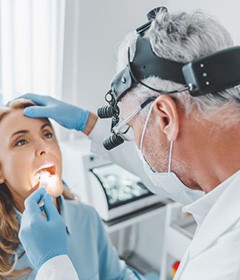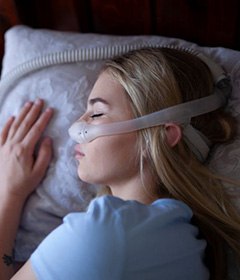Sleep Apnea Therapy – Freedom, WI
Breathe Easier and Rest Better

If you snore, wake up feeling tired after a full night’s sleep, or your partner has noticed you tossing and turning, you deserve better rest! You may be suffering from sleep disordered breathing (SDB) that manifests as sleep apnea — and sleep dentist Dr. Robert Heil is uniquely qualified to diagnose and treat this condition. Continue reading below to learn more about sleep apnea and how our team can help you to breathe easier and rest better.
Why Choose Dental Expressions for Sleep Apnea Therapy?
- Highly Experienced Sleep Dentist
- Convenient Treatment Options
- Friendly & Empathetic Team
What Is Sleep Apnea?

A person suffering from sleep apnea stops breathing repeatedly throughout the night. There are three main types of sleep apnea: obstructive sleep apnea (OSA), central sleep apnea (CSA), and mixed sleep apnea (MSA). OSA is the most common form of the condition, caused by a partial or complete blockage of the airway during sleep. CSA occurs from a breakdown of communication between the brain and the muscles that control breath. MSA is a combination of the two.
People with sleep apnea may have their sleep interrupted hundreds of times in one night. The brain, deprived of oxygen, sends an emergency signal to wake the body up. The sufferer will jerk awake to resume breathing — something that they may not remember the next day. The sleeping partner is usually the first person to recognize a problem.
Symptoms of OSA include loud snoring, daytime exhaustion, morning headaches and sore throats, mood swings, sexual dysfunction, and more.
The Dangers of Sleep Apnea

At first, sleep apnea might not seem like a major issue. However, it is important to remember that it is a serious health condition! If your brain and body are continually functioning with suboptimal oxygen levels, it can put a ton of stress on your heart, lungs, brain, and other important systems. Poor sleep quality is commonly associated with many health complications.
Untreated OSA is connected to a higher risk of:
- Heart attack
- Stroke
- Hypertension
- Dementia
- Diabetes
- Unwanted weight gain
- Car accidents
- Depression and anxiety
If you suspect you have sleep apnea, it is important to seek timely treatment. Otherwise, your quality of life could greatly suffer. Sadly, some people even experience premature death due to apnea-related complications.
Diagnosing Sleep Apnea

Because the symptoms of sleep apnea are similar to those of other conditions affecting sleep, it may remain mis- or undiagnosed for years. Do you suspect you or a loved one are suffering from SDB? Answer these five questions to help identify a sleep disorder.
- Do you have difficulty falling asleep or staying asleep?
- Do you snore?
- Are you frequently tired during the day?
- Are you aware or have you been told that you stop breathing during sleep?
- Do you wake up feeling tired, even after a full night’s sleep?
If you answer yes to even one of these questions, please continue by taking the Epworth Sleepiness Scale and the STOP-BANG survey. Download, print out, and fill in the tests. Bring them with you to Dental Expressions for your sleep apnea consultation. Having this information will help your doctor make a proper diagnosis.
Sleep Apnea Treatment Options

Treatment for obstructive sleep apnea may come in the form of CPAP, or continuous positive airway pressure, therapy. It is a machine that pushes air into the oral cavity to keep the airway open during sleep. Patients who do not find relief with a CPAP machine often benefit from a removable oral appliance, a small device that gently repositions the tongue and lower jaw during sleep. Some people benefit from combined therapy, using both CPAP and a removable oral appliance. Our team can evaluate the details of your case and tailor a treatment plan to fit your unique circumstances and preferences.






